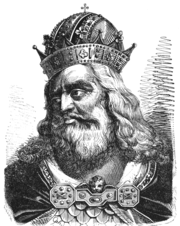8th century
The VIII century d. C. (eighth century AD) or VIII century and. c. (eighth century of the common era) began on January 1, 701 and ended on December 31, 800. It is called the "Century of the Saracens".
This century is notable for Muslim expansion; The Arabs definitively conquer North Africa and invade the Iberian Peninsula, where they defeat the Visigoths of King Rodrigo, who dies in battle. Due to internal disputes and the lack of effective resistance, the Visigothic Kingdom of Toledo disappeared, assimilated by the Umayyad Caliphate. These Saracens cross the Pyrenees and invade Frankish territory, being stopped by Carlos Martel in the decisive battle of Poitiers, definitively stopping the Muslims. Decades later, the King of the Franks, Charlemagne, founds the Carolingian Empire, and is recognized as Emperor by the Pope himself. However, said empire will barely survive Charlemagne himself, since after the death of his weak son, his grandchildren will divide his empire. His division of the empire will lay the foundations for the kingdoms of France and Germany.
While, in the East, the Muslims expand their borders to the Indus River, on the border with India, reaching their maximum expansion in the East, in the Indus, and in the West, in the province of Septimania. For its part, the Byzantine Empire suffered the siege of Constantinople in 717 and 718 at the hands of the Arabs, a siege that managed to be broken thanks to the help of the Bulgarians and the almost impregnable defenses of the city.
Relevant events
Wars and Politics
- The collapse of Maya Civilization begins
- The rise of the Empire of Ghana in West Africa.
- 701: The Taihō Code is published in Japan
- 705: Tang Dynasty is restored in China after the overthrow of Emperor Wu Zetian.
- 711: Tariq ibn Ziyad landed near Gibraltar, defeating the Visigoths in the battle of Guadalete and ending the Visigoth kingdom of Toledo.
- 717-718: the Arabs begin the siege on Constantinople, the city is liberated by the help of the Bulgarians.
- 732: Carlos Martel defeats the Muslims in the battle of Poitiers, stopping the Muslim advance definitively.
- 751: In the battle of the Talas, an Arab-Turkish army defeats a Chinese army of the Tang dynasty in the present Kyrgyzstan. After this, the Arabs manage to conquer all Central Asia.
- 754: Carlomagno conquers Italy and creates the Pontifical States, which will be governed by the Pope. Such States will survive more than 1000 years until the Italian Unification of the centuryXIX.
- 756: Abderramán I the last member of the Omeyas takes Cordoba by founding the emirate of Cordoba separating from the caliphate of Baghdad.
- 755-763: The Rebellion of An Lushan devastates China's territories during the Tang dynasty government period, which is extremely weakened.
- 772-804: Carlomagno invades northwest Germany, annexing the Duke of Saxony to the Carolingian Empire after 30 years of struggles.
- 792: The Bulgarians defeat the Byzantines in the Battle of Marcelae, led by Emperor Constantine VI.
- 793: First Viking Attack on the British Islands, in the monastery of Lindisfarne.
- 794: The Heian Period begins in Japan and its capital Kyoto.
- 800: Aglabi emirate is established in North Africa after it is separated from the Abbasid Caliphate.
- 800: At Christmas, Charlemagne is crowned as "Roman Emperor" by Pope Leo III. Some historians consider this event as the beginning of the Holy Roman German Empire.
- Takrur Kingdom boom in West Africa.
Culture
- First record of the Japanese poetry of the Haiku style.
- 726: Leo III the Isaurus establishes iconoclasis as a religious policy.
- 787: The Byzantine Empress Irene calls the Second Council of Nicaea to discuss the theme of iconoclasis.
Relevant people
- Abderramán I (731-788): founder of the Omeya independent dynasty in al-Ándalus.
- Adriano I (- 795): Pope of Rome, his papacy was one of the most durable in history.
- York Alcuino (735 - 804): holy by the Anglican church, theologian and Anglo-Saxon pedagogue.
- Beda (672 - 735): Saint and writer of Anglo-Saxon origin.
- Charlemagne (742 - 814): founder of the Carolingian Empire.
- Carlos Martel (686 - 741): Austrasia Palace butler.
- Desiderio (710? - 786): last king of the Lombards.
- Don Pelayo (- 737): first monarch of the Kingdom of Asturias (718-737).
- Du Fu (712 - 770): Chinese poet.
- Stephen II (715 - 757): Pope of Rome and founder of the Pontifical States.
- Harún al-Rashid (766 - 809): Abbasid caliph.
- Irene (752 - 803): Saint of the Orthodox Church, Byzantine Empress.
- Juan Damasceno (675 - 759): theologian and Syrian writer.
- Li Bai (701 - 762): Chinese poet.
- Marwan II (688 - 750): last caliph of the Omeya Caliphate.
- Musa ibn Nusair (640 - 716): Muslim military leader.
- Nicephorus I (765 - 811): Byzantine emperor.
- Padmasambhava: founder of the Tibetan school of Nyingma Buddhism.
- Pipino el Breve (715 - 768): Austrasia and Neustria palace butler, father of Carlomagno.
- Rodrigo (688-711): Last Monarch Visigoth of the Visigoth Kingdom of Toledo (710-711).
- Tariq ibn Ziyad (689 - 720): Muslim military leader.
- Theodulph of Orleans: Saint and Bishop of Orleans of Spanish origin.
- Tervel: Emperor of the Bulgarians.
- Walid I (668 - 715): omeya caliph.
- Xuanzong (685 - 752): Chinese emperor of the Tang dynasty.
Contenido relacionado
History of Logic
GM-NAA I/O
Hittite laws
Donation of Pepin
History of optics



